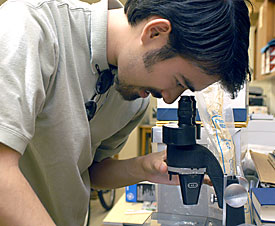 |
|
MALLORY LORING/Arizona Daily Wildcat
|
Eric Yip, theater arts senior, spent his summer studying spiders in Ecuador. Yip is seen working in his lab at the Biological Sciences East building.
|
|
|
By Ian Musil
Arizona Daily Wildcat
Monday September 22, 2003
Deep in the jungles of Ecuador, Eric Yip was on a mission this summer.
Yip, an ecology and evolutionary biology senior, was on the hunt for a Guacamayos spider, found in only a few places in the world. Unlike most other arachnids, which are solitary, the Guacamayos spider lives in colonies.
Studying these colonies gives researchers insight into the development of social instincts in any animal, including humans, Yip said.
Yip's trip to the Ecuadorian rainforest was paid for by BRAVO, or the ╬Biomedical Research Abroad: Vistas Open' program.
BRAVO sent its first student to Egypt in 1992 and since then has strived to fulfill its mission of exposing undergraduates to scientific research and life experiences abroad.
"Students are our best ambassadors," said Carol Bender, the director of the Undergraduate Biology Research Program, which runs BRAVO. "They help everyone realize that we are all facing the same problems, in science and life."
More than 110 participants have traveled to two-dozen countries on six continents since the program began, with one-third of them going to developing countries.
"Our students can help bring these (developing) countries along scientifically by teaching the lab mates how science is done in the U.S. and helping them learn English."
Bender said BRAVO is an important investment in education, especially in light of today's global environment, because the program brings UA students and citizens from around the world closer together.
During his research abroad, Yip connected with two Ecuadorians, Patricio and Gabriel, who were able to keep him well fed during long stretches in the rain forest.
Yip said their skill in the outdoor kitchen was his saving grace.
"Most the time we had no refrigerator and had to eat combinations of granola, flour, and canned fish," Yip said. "(Patricio and Gabriel) got very creative and the food was actually good. And sometimes, Gabriel's mother would come out to the forest and bring us chicken and soup."
Living in a rain forest has also given Yip a deeper understanding and respect for the value of conservation.
"I don't think you can go to the rain forests and not develop an awe for the beauty and the diversity there," Yip said. "You develop an understanding that these forests are worth saving for esthetic value alone, regardless of what medical cures they might hold or what effect their absence might have on the rest of the environment."
Diversity is important to the BRAVO program. Biology, journalism, philosophy, business and education majors have all participated, Bender said.
BRAVO takes advantage of the UA's international connections by bringing students together with more than 800 scholars in order to give students a worldly outlook.
"People really need to be aware what's going on everywhere. A lot of Americans are not aware of much. We have an overpowering presence on an international stage. People don't understand the responsibility that comes with that," Yip said.
Science educators from around the nation look to BRAVO as a model program for undergraduates doing research abroad.
According to Bender, BRAVO was a main part of the reason the UA was recognized in 1998 by the National Science Foundation as one of ten universities that excel in the integration of research and education.
Bender has been asked to travel to other universities to help their faculty develop programs similar to BRAVO. She has written publications aimed at helping other institutions create programs for undergraduates to do science overseas.
"Every time you send an undergraduate abroad there's a ripple affect," Bender said. "These students have made a difference in the lives of a lot of people."
